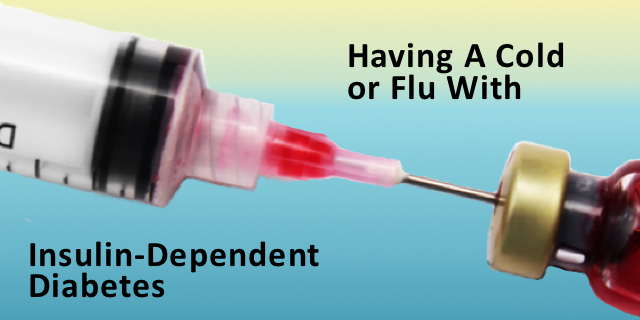Vigilance is the watchword for caregivers of people with insulin-dependent diabetes. What do you need to know when illness strikes?
Energy
The body requires more energy when it is sick. That energy fuels the immune system’s fight against infection. People who are sick are often not interested in eating. With type 1 diabetes or insulin-dependent diabetes and illness, there is a risk of not maintaining enough glucose in the blood for this to occur. This decrease in food intake can lower blood sugar and increase the risk of fat burning. Fat burning leads to ketone production and ketoacidosis–a serious, life-threatening condition.
Monitor
When your loved one with insulin-dependent diabetes is sick, its important to take blood sugar readings more frequently. You should also monitor ketones. Ketones are the byproduct of fat burning: when the body goes into “starvation” mode cells begin to burn fat. In time, the tissues of the body and the blood stream become acidic. According to Mayo clinic, untreated diabetic ketoacidosis can be fatal. Remember, diabetic ketoacidosis can occur in a person with normal blood sugar readings. Monitor ketones every 6 to 8 hours using home blood and urine testing kits.
Fluids
Offer your loved one lots of fluids with simple, easy to digest carbohydrates in them. It’s important to drink lots of fluids when sick with stomach illness and respiratory illness. For stomach illness, fluids are lost through vomiting and diarrhea. Increasing fluids during respiratory illness thins mucus. Ginger ale, apple or pear juices are all good choices. Avoid milk and caffeine. Warm beverages like mint or ginger tea with sugar or honey sweetening work well. Popsicles or frozen ice cubes of apple juice, or a slushy of frozen juice put through a blender will sooth the throat.
Know the Signs of Low Blood Sugar
As a caregiver or someone with insulin-dependent diabetes, it’s important to know the symptoms of low blood sugar.
- Irritability, confusion, or anxiety
- Trembling, weakness, palpitations and sweating
- Hunger, sugar cravings
- Headache
- Extremely low blood sugar can result in seizures or coma.
Stay Healthy Yourself
Proper hand washing is one of the best ways to stay healthy. Get enough sleep and stay vigilant.
Before illness strikes, it’s good to know how to deal with it. What do you think? Do you have ideas or suggestions on how you have dealt with illness and insulin-dependent diabetes? Please share them in the comments section below and thanks.







Very informative
May save a life
Family members should read this
I’m an insulin dependent diabetic. I had no idea about some of these things, and found this very helpful.
John, Thank you so much for letting us know that this was helpful to you. Kathleen
I had a burning sensation when injecting and the article advised to wait for the alcohol in the area to be injected to dry before injecting.
Now I think I can avoid that burning sensation. Thanks